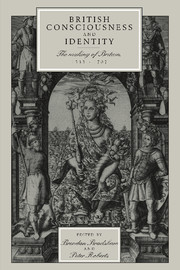Book contents
- Frontmatter
- Contents
- Notes on the contributors
- Preface
- Introduction
- 1 Tudor Wales, national identity and the British inheritance
- 2 The English Reformation and identity formation in Ireland and Wales
- 3 Faith, culture and sovereignty: Irish nationality and its development, 1558–1625
- 4 From English to British literature: John Lyly's Euphues and Edmund Spenser's The Faerie Queen
- 5 The British problem in three tracts on Ireland by Spenser, Bacon and Milton
- 6 James Ussher and the creation of an Irish protestant identity
- 7 Seventeenth-century Wales: definition and identity
- 8 Scottish identity in the seventeenth century
- 9 The Gaidhealtachd and the emergence of the Scottish Highlands
- 10 ‘No remedy more proper’: Anglo-Irish unionism before 1707
- 11 Protestantism, constitutionalism and British identity under the later Stuarts
- Index
6 - James Ussher and the creation of an Irish protestant identity
Published online by Cambridge University Press: 15 March 2010
- Frontmatter
- Contents
- Notes on the contributors
- Preface
- Introduction
- 1 Tudor Wales, national identity and the British inheritance
- 2 The English Reformation and identity formation in Ireland and Wales
- 3 Faith, culture and sovereignty: Irish nationality and its development, 1558–1625
- 4 From English to British literature: John Lyly's Euphues and Edmund Spenser's The Faerie Queen
- 5 The British problem in three tracts on Ireland by Spenser, Bacon and Milton
- 6 James Ussher and the creation of an Irish protestant identity
- 7 Seventeenth-century Wales: definition and identity
- 8 Scottish identity in the seventeenth century
- 9 The Gaidhealtachd and the emergence of the Scottish Highlands
- 10 ‘No remedy more proper’: Anglo-Irish unionism before 1707
- 11 Protestantism, constitutionalism and British identity under the later Stuarts
- Index
Summary
History, remembered and forgotten, told and retold, imagined and invented, plays a vital role in forming a people's sense of national identity. Carefully manipulated, it can be used to bring together disparate groups and communities into cohesive nations. The continuing union of Scotland, England and Wales owes much to the shaping of historical memory that produced the binding concept of Britishness. Equally, however, contentious and disputed histories can sometimes split societies and divide their racially distinguishable elements into warring factions, each sustained by distinctive origin myths. One such battleground was, and remains, Ireland: here conflicting identities continue to characterise its culture and frustrate both neat academic labelling and ambitious political panaceas. The aim of this chapter is to outline in some detail the origins, and briefly to analyse the ambiguities, of one skein of Irish identity, the protestant tradition, concentrating upon the way in which in the early modern period it appropriated and developed a particular vision of Ireland's history. This sense of protestant identity was distinguished by its ‘doubleness’, its ability to face both ways: to reject the blandishments of a wider British consciousness then developing in imperial England and identify with Irish culture and history, whilst at the same time carefully distinguishing themselves from other communities in Ireland.
By 1600 Ireland's confused history of partial colonisation and recolonisation had left a legacy of three contrasting communities: the native Irish, heirs of Ireland's ancient Celtic civilisation; the New English, the most recent wave of settlers and officials sent over by English monarchs anxious to secure their hold on Ireland; and, in between, the Anglo-Irish, the descendants of the twelfth-century Anglo-Norman invaders.
- Type
- Chapter
- Information
- British Consciousness and IdentityThe Making of Britain, 1533–1707, pp. 185 - 212Publisher: Cambridge University PressPrint publication year: 1998
- 5
- Cited by



